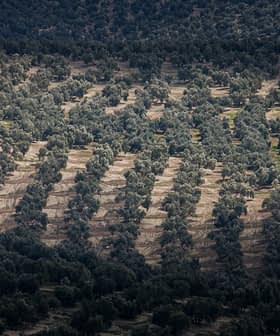Jaencoop to Become Second Largest Olive Oil Producer After Merger
Jaencoop and Olivar de Segura have agreed to merge. The two cooperatives both bring different strengths to the new producer.
After negotiations that lasted several years, the olive oil production cooperatives Jaencoop and Olivar de Segura have agreed to merge.
The resulting conglomerate will be the second largest producer and distributor of olive oil in the world, after Dcoop in Málaga, Spain, with an average annual turnover of more than €250 million ($286 million).
At the present time, it doesn’t make sense to go it alone. Now we are going to have more muscle in the international markets and greater guarantees of production.
Both groups are based in the province of Jaén, in Andalusia, the area of Spain that each year accounts for almost one-third of the world’s olive oil yield.
Each part will contribute its strongest assets to the new entity. Jaencoop owns 247,000 acres of olive groves that yield 80,000 to 90,000 tons of olive oil on average, but packs a proportionally small quantity of up to 2.5 million liters (0.66 million gallons).
See Also:Spanish Olive Oil ProductionOlivar de Segura on the other hand, produces about 20,000 tons of olive oil from its 74,000 acres of groves, but due to its packaging infrastructure, it bottles significantly more olive oil ranging up to four million liters (approximately one million gallons) each season.
In order to exploit each other’s capabilities and to achieve economies of scale, the planned merger will enable the production capacity of Jaencoop to take advantage of the packaging dynamics of Olivar de Segura and vice-versa.
The new entity will ultimately engulf 28 associations with 26,000 farming partners, 320,000 acres of olive groves and an expected production of 120,000 tons for the 2018/19 season, accounting for 17.5 percent of Jaén’s production and nine percent of the olive oil crop for the whole of Andalusia.
It will handle and distribute a dozen brands of olive oil and organic olive oil to more than 20 markets around the world, including the protected designation of origin (PDO) brands Sierra de Cazorla and Sierra de Segura.
Ángel Rodriguez, president of Olivar de Segura, pointed out that the fact that big projects demand substantial infrastructures led to the merger.
“We wanted a strong group in the province,” he said. “We have projects with great potential that require a greater volume of production to supply them and now we are going to be a group with a great dimension.”
His counterpart at Jaencoop, Cristóbal Gallego Martinez, said that the merger is about taking advantage of the synergies and that they want to enhance their presence abroad by offering high quality and large quantities of olive oil.
“At the present time, it doesn’t make sense to go alone,” he said. “Now we are going to have more muscle in the international markets and greater guarantees of production.”
The new entity will be structured in sections (ecological, supplies, denominations of origin, etc.) and will likely operate under the name of Jaencoop, but without totally discarding the Olivar de Segura brand name, which will be used for its name recognition among consumers.








